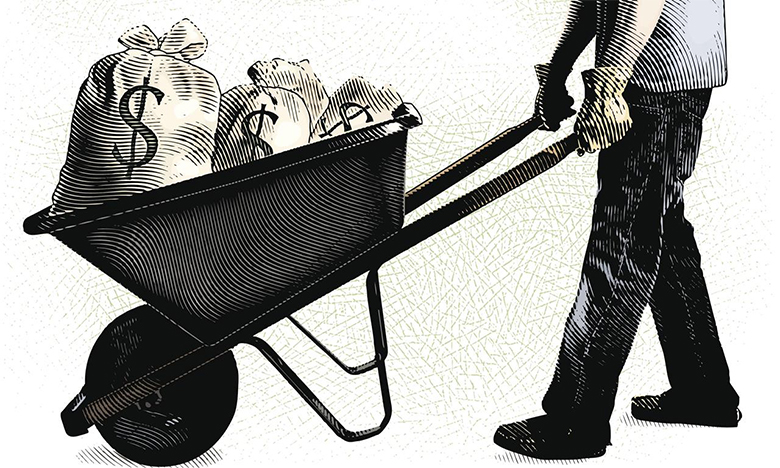When Erika Doe* chose to dual major in elementary and special education, professors and advisers told her that she was basically guaranteed a job. But after graduating during the Great Recession from Marywood University in Scranton, Pennsylvania, she spent the next four years scraping by as an occasional substitute teacher. Even worse, her student loans ballooned into the six digits as she struggled to make payments.
Desperate, she needed to find a job soon or declare bankruptcy. “I talked to bankruptcy lawyers in Pennsylvania — nobody would look at it,” Doe recently told OZY, and the Pennsylvania native still “couldn’t get a job for the life of me.” Hearing that Colorado needed teachers, she and her fiancé headed West. Within two weeks she had the job; within six months, the bankruptcy.
Doe isn’t alone. “Half of my friends moved away from the area because they couldn’t find jobs — or, rather, jobs that were high enough,” she says. More than a third of survey respondents told the financial advice site Student Loan Hero that they would consider moving if it could save them $3,000 or more annually on their loans. And while the migration of millennials due to student loan debt has yet to be studied closely, anecdotal accounts seem to support the trend. In the past decade, five of the 10 states with the lowest average student loan debt — Utah, Nevada, Arizona, Washington and Oklahoma — also saw some of the largest percentage increases in millennial populations.
States are realizing that playing the loan game can make them more competitive. Kansas, for instance, will cover $3,000 of your loans for each year you live in a designated rural county for up to five years. Michigan has offered to share newcomers’ housing costs. Memphis announced in June a program to pay $50 per month off the loans of employees who have worked at least a year for the city. Niagara Falls, New York, will make $7,000 in loan payments over two years for new residents, and New York state recently created the Excelsior Scholarship, which gives one year of free college to locals in return for a year working in the state.
Of course, there’s always “a cost benefit,” where the right job can be better than an incentive offer, says Samual Garner, a University of Pennsylvania graduate who left for Maryland with hundreds of thousands in loans. But that benefit could be tilting toward relocation: As increased broadband access and telecommuting make location matter less than ever before, debt migration could just be savvy economics.
The problem is particularly acute in Pennsylvania, which has the second-highest average student debt in the nation. The state had a net loss of almost 13,000 educated millennials in 2014 (the most recent available data), and college loan costs were specifically mentioned as a factor in an April report from the Pennsylvania Independent Fiscal Office. When asked by OZY to query its database of 125,000 student loan borrowers, Montana-based Givling, which uses funds from an online trivia game to pay student loans based on a lottery, received a dozen responses within 24 hours from students who said they left Pennsylvania because of their loan burden. “The very pernicious problem with student loans is these people are making life decisions — when to get married, when to have a baby, where to live — solely on their loan,” says Lizbeth Pratt, the CEO of Givling. “And this is the first time in American history that that’s been true.”
To an extent, borrowers have always considering chasing cities with more job opportunities to help pay what they owe. “After my program ended, I probably would have stayed in Philadelphia,” Garner says, but the New York native had studied bioethics and knew a move was likely in his future. In “such a competitive market … you have to go wherever [the jobs] are,” adds Nick Lyon, who graduated with $80,000 in loans and a graduate degree in theater design from Temple University. “[Philadelphia] has a lot to offer, so it’s unfortunate I had to move to New York.” In his case, he was chasing job opportunities as much as chasing debt, a tale as old as time.
What’s changed though is the dominance of student loans in that decision. Unlike mortgages and car payments, loans can’t be resold. And unlike credit cards, debt often reaches into the tens of thousands. Worse, as Doe learned, bankruptcy is much harder to attain for educational loans than it is for other economic hardships. (Currently, 11 of the 12 U.S. circuit courts of appeals have adopted an “undue hardship” standard for dealing with student loan–related bankruptcy, which can be difficult to prove.) “It’s a huge burden,” says Lyon, who has known friends who fell behind on payments. “When they hit rock bottom, it’s not like the student loans go away. They are always there.”
Leaving that debt behind can be life-changing, as it was for Alyssa Foster, who attended college in her home state of Montana before leaving for California after graduating with $40,000 in debt. A few years in, she wanted to return home, but “my initial payments were higher than my monthly rent,” she says, so that “dropping income at all to change a career, or go to a place that makes you happy, just doesn’t work.” But in 2015, Foster won one of the Givling lotteries. “The only reason I was able to move home was because I didn’t have my student loan payment,” she says. “It’s just this burden that nobody really talks about. And you can’t complain about it because it’s just, well, everybody has it.”

